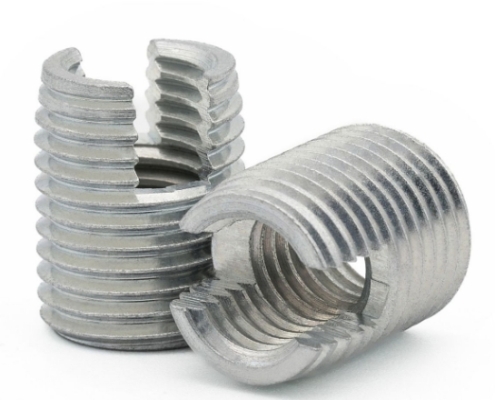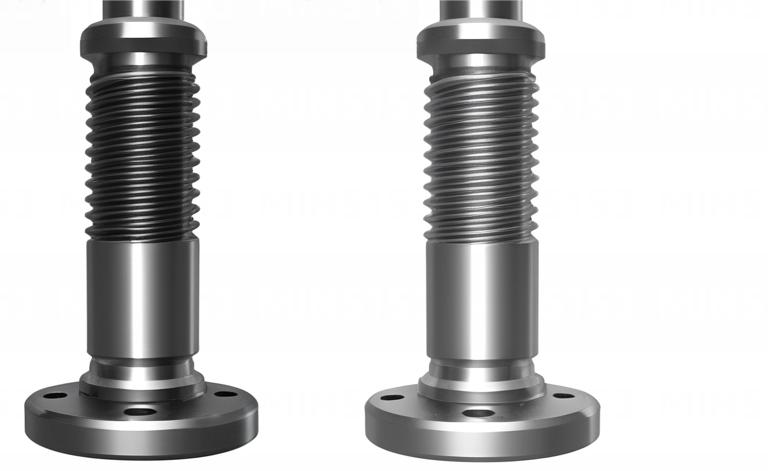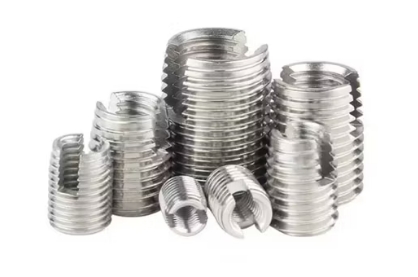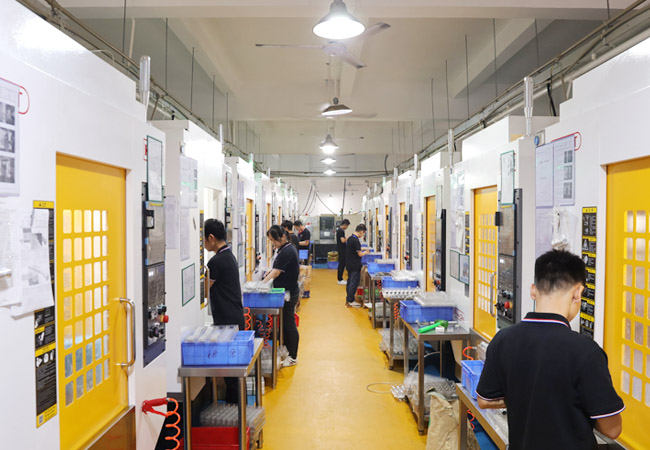What are UNF Threads and UNC Threads? | Difference Between UNF and UNC Thread
Choosing the wrong thread type can lead to significant risks, including connection failures and equipment damage. Understanding the importance of choosing the correct thread type, such as UNF and UNC threads, can help prevent these issues.
UNF and UNC threads are both part of the Unified Thread Standard (UTS), but they are designed for different applications and have distinct characteristics. UNF threads are finer with closer pitches, suitable for precision applications. UNC threads are coarser, offering stronger connections and easier assembly. Both have unique advantages based on their intended applications.Knowing when to use each can improve the quality and safety of your connections.
Read on to explore the differences, applications, and benefits of UNF and UNC threads. By understanding these differences, you can make an informed decision on which thread type is most suitable for your specific project.
What Are UNF Threads?
UNF threads, or Unified Fine threads, represent a category of threading employed in applications that demand high precision. The acronym “UNF” denotes “Unified Fine,” and these threads are defined by their fine pitch, which indicates a greater number of threads per inch. UNF threads are particularly suited for scenarios where stringent tolerances and exceptional accuracy are essential. Industries such as aerospace, medical devices, and precision machinery frequently utilize UNF threads to meet their stringent requirements.

What Are UNC Threads?
UNC threads, or Unified Coarse threads, constitute another variety of threading within the Unified Thread Standard. These threads are characterized by a coarser pitch, indicating a reduced number of threads per inch compared to UNF threads. UNC threads find extensive application in construction, machinery, and automotive sectors, where the focus is on strength and ease of installation. Their design facilitates robust connections and allows for efficient assembly processes in various industrial settings.
What Is the Difference Between UNF and UNC Threads?
The primary differences between UNF and UNC threads lie in their pitch, thread shape, and the applications for which they are best suited. Below are the key distinctions:

1. Pitch and Thread Profile:
UNF Threads: UNF threads have a finer pitch, meaning the threads are spaced closer together. This fine pitch allows for higher precision, making them ideal for applications where tight tolerances and accurate connections are essential.
UNC Threads: UNC threads have a coarser pitch, with the threads spaced farther apart. This coarse profile makes UNC threads easier to install and more robust in heavy-duty applications, but they are less suitable for precise connections.
2. Application and Usage:
UNF Threads: Due to their fine pitch, UNF threads are commonly used in industries where precision and accuracy are critical. These threads are often found in aerospace, medical devices, electronics, and other high-precision fields where the integrity of the connection is paramount.
UNC Threads: UNC threads are more commonly used in construction, automotive, and manufacturing applications, where strong and reliable connections are necessary. They are preferred for their ability to withstand high stresses and provide fast, secure assemblies.
3. Durability and Stress Resistance:
UNF Threads: While UNF threads offer high precision, they are less effective in handling heavy loads and vibrations. The finer pitch makes them more susceptible to stripping under high stress, making them unsuitable for high-load applications.
UNC Threads: The coarser pitch of UNC threads provides superior strength and durability in high-stress environments. These threads are designed to handle greater loads and are less likely to strip or break under pressure. This makes them ideal for heavy-duty applications such as construction and machinery assembly.
4. Ease of Installation:
UNF Threads: The fine pitch of UNF threads can make them more difficult and time-consuming to install, requiring greater care to avoid damage or improper engagement. This is typically not an issue in high-precision settings where accuracy is the priority.
UNC Threads: The coarser pitch of UNC threads makes them easier to install quickly, which is a significant advantage in environments where speed and efficiency are crucial.
5. Precision vs. Strength:
UNF Threads: UNF threads are designed for applications requiring high precision and tight tolerances. They provide a secure connection where small changes in alignment or fit could lead to failure.
UNC Threads: UNC threads are designed for applications where strength and durability are the main priorities. They are less concerned with precision but excel at providing robust, long-lasting connections in heavy-duty settings.
Advantages of UNF Threads
UNF threads are widely used in precision-driven industries such as aerospace, medical, and electronics due to their fine pitch and secure fit. While they offer excellent accuracy and vibration resistance, they also come with certain manufacturing and application challenges. The table below summarizes their key advantages and considerations:
| Aspect | Description |
|---|---|
| High Precision | Fine pitch ensures a tight and secure fit, reducing the risk of displacement. |
| Vibration Resistance | Provides excellent resistance to loosening under vibrations or external forces. |
| Ideal for High-Precision Applications | Preferred in aerospace, medical, and electronics industries due to their accuracy. |
| Complex Manufacturing | Requires precise machining and tighter tolerances, increasing production complexity. |
| Challenging Installation | More difficult to install compared to UNC threads, requiring careful handling. |
| Lower Load-Bearing Capacity | Fine threads are less suitable for heavy load applications. |
| Prone to Stripping | Delicate thread structure can be damaged if not handled properly. |
Advantages of UNC Threads
UNC threads offer several key benefits, particularly in heavy-duty applications where strength and ease of installation are crucial. Below are the main advantages of UNC threads:
-
Strength and Durability – The larger thread profile provides higher resistance to stress and strain, making UNC threads ideal for demanding applications such as construction and heavy machinery.
-
Ease of Installation – The coarser pitch allows for quicker and simpler installation, reducing assembly time and effort.
-
Resistance to Stripping – The wider thread spacing distributes forces more evenly, reducing the risk of stripping or thread damage under high loads.
-
Ideal for Heavy-Duty Applications – Commonly used in industries like construction, automotive, and large machinery where strong, reliable connections are essential.
-
Better Performance in Soft Materials – The coarse thread profile allows for improved grip and holding strength in softer materials such as wood, plastic, and aluminum.
Application of UNC (Unified Coarse) Thread
UNC threads are widely used in various industries due to their strength, ease of installation, and durability. Below are their key applications:
1. Construction Industry
Used in structural components, scaffolding, and building frameworks where strong and reliable connections are required.
2. Automotive Sector
Common in bolts, screws, and fasteners for vehicle assemblies, ensuring secure and durable connections in high-stress environments.

3. General Manufacturing
Applied in machinery, equipment, and industrial tools that demand fast and efficient assembly.
4. Large Machinery and Heavy Equipment
Ideal for fastening components in machines that experience high loads and vibrations.
5. Better Grip in Various Materials
The coarse thread pitch provides excellent holding strength in materials like steel, aluminum, and softer metals.
6. Specialized Applications (UNS Threads)
In certain cases, UNS threads (a variant of UNC threads) are used in pressure vessels, industrial tools, and other applications requiring specific strength and durability.
Application of UNF (Unified Fine) Thread
UNF threads are widely used in industries where precision, secure fastening, and vibration resistance are essential. Below are their key applications:
1. Aerospace Industry
Used in aircraft components, fasteners, and structural parts that require high precision and strong resistance to vibration.
2. Medical Equipment
Found in surgical instruments, implants, and precision medical devices where secure and reliable connections are critical.
3. High-Precision Engineering
Applied in sensors, measuring instruments, and delicate machinery that require fine adjustments and minimal tolerance for error.
4. Fasteners for Precision Machinery
Used in applications where bolts, screws, and connectors must provide a tight and stable fit without loosening over time.
5. Resistance to Vibrations and Stresses
The fine pitch ensures better grip and stability in environments where external forces could otherwise cause fasteners to loosen.
What Is the Strongest Thread to Use?
The “strongest” thread depends on the specific requirements of the application. In terms of tensile strength and resistance to shear forces, UNC threads are generally stronger due to their coarser pitch and more substantial material engagement. However, the strength of a thread also depends on the material it’s made from and the specific design of the fastener.
In certain high-precision applications, UNF threads might offer better overall performance, especially when used with materials that are prone to loosening under vibration. But for most general applications where strength is the priority, UNC threads tend to be more robust.
How to Choose UNC and UNF Threads?
When choosing between UNC and UNF threads, there are several important factors to consider: precision requirements, strength and durability, installation speed and environment, and the specific application. Each of these factors plays a crucial role in determining the most appropriate thread type for your needs. Below is a detailed description of each factor:
1. Precision Requirements:
UNF threads are ideal when high precision is required, offering tighter tolerances for accurate connections. This makes them perfect for aerospace or medical applications, where exact fits are crucial. On the other hand, UNC threads, with their coarser pitch, provide less precision but are suitable for environments where strength and durability take precedence over fine tolerances, such as construction or automotive industries.
2. Strength and Durability:
UNC threads excel in high-stress environments due to their coarse pitch and strong, durable connections. They are well-suited for heavy-duty applications like construction and machinery. UNF threads, though not as strong, offer secure and reliable connections in precision-focused industries, where the emphasis is on accuracy rather than load-bearing capacity.
3. Installation Speed and Environment:
UNC threads are easier and faster to install thanks to their coarse pitch, making them ideal for quick assembly in construction or manufacturing. In contrast, UNF threads require more careful installation, which makes them better suited for applications where precision is paramount, even if it means longer installation times, such as in aerospace or medical equipment.

4. Application Example – Aerospace vs. Construction:
UNF threads are commonly used in aerospace applications, where the focus is on precision and high-performance, ensuring secure connections in extreme conditions. UNC threads are more prevalent in construction, where strength, fast installation, and durability are essential, particularly in heavy machinery or structural assemblies that must endure significant stress.
5. Other Factors – Vibration and Environmental Conditions:
UNF threads provide superior resistance to vibration, making them ideal for environments where components experience frequent movement, such as in aerospace. Meanwhile, UNC threads are better for heavy-duty applications that endure constant vibration and stress, such as in automotive or industrial machinery, where strength and reliability are more critical than fine precision.
Choose VMT for Thread Machining
VMT technology can be used for thread processing, whether it is UNF thread or UNC thread. We are equipped with 66 3-axis, 4-axis and 5-axis machine tools, including 30 CNC lathes and 20 automatic lathes, which provides sufficient capacity to handle various aluminum alloy CNC machining tasks. In addition, we also have many mature processing technology cases to ensure that you can provide you with high-quality services.

In Conclusion
In summary, understanding the key differences between UNC and UNF threads can help you choose the right thread type for your project. UNF threads are ideal for high-precision applications, while UNC threads excel in situations requiring strength and fast installation. By considering the specific requirements of your project, you can ensure that you select the most suitable thread type for optimal performance and reliability.
Frequently Asked Questions About UNF Threads and UNC Threads
Where is UNF Thread Used?
UNF (Unified National Fine) threads are commonly used in precision machinery, automotive, aerospace, and manufacturing applications where high strength and tight tolerances are required. They provide a finer pitch for better engagement in smaller or more compact spaces.
What is the Use of UNF Thread?
UNF threads are used to create strong, secure fastenings in applications that require finer thread engagement. They are ideal for applications with limited space, high precision, and where vibrations or external forces may impact the joint.
Is NPT the Same as UNF?
No, NPT (National Pipe Thread) and UNF are not the same. NPT is a tapered thread used for sealing pipe joints, while UNF is a fine-thread system used for precise fastenings, primarily in machinery and mechanical applications. They have different thread profiles and applications.



